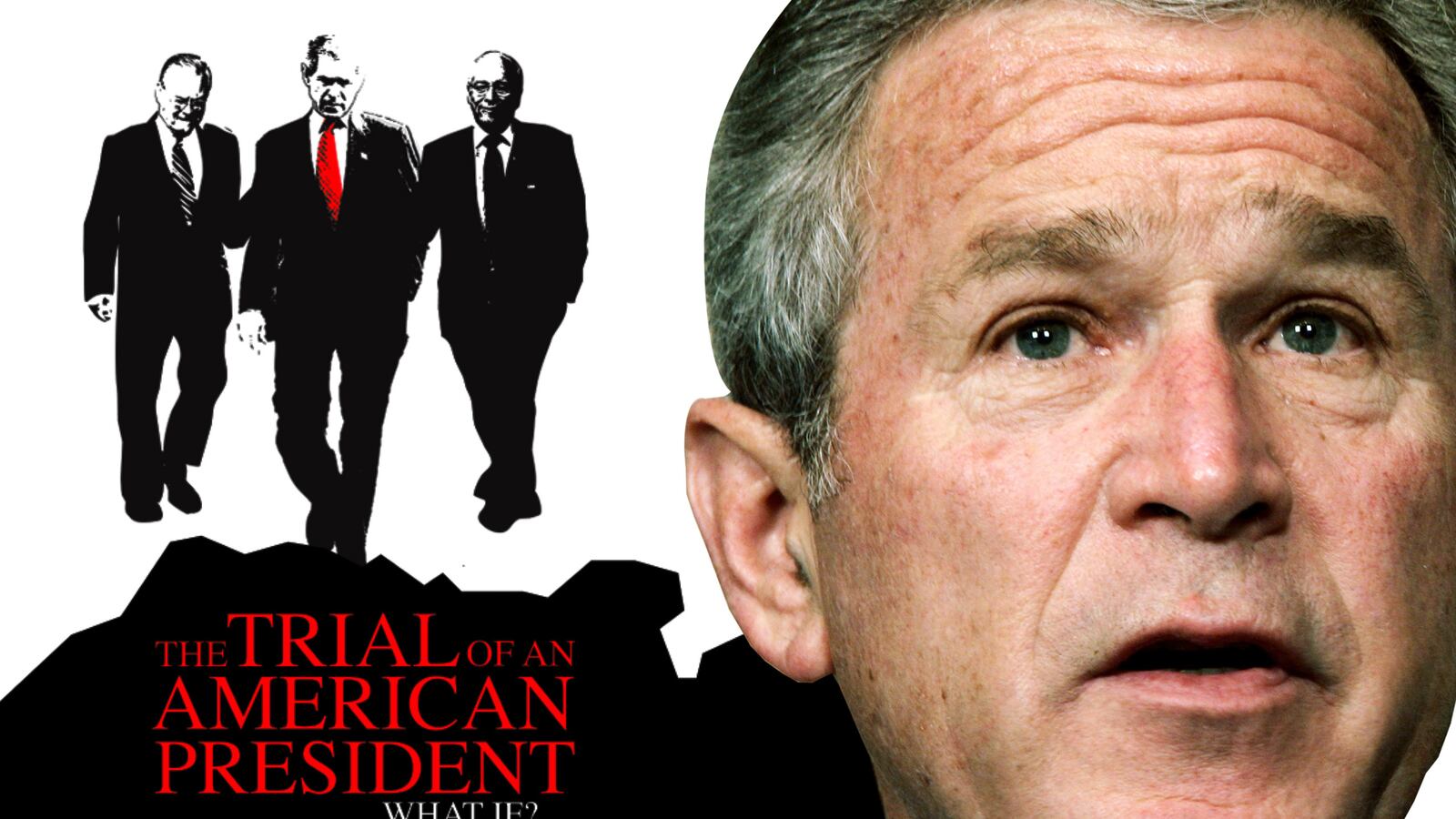President George W. Bush was found guilty of war crimes last night at the International Criminal Court in the Hague. The jury vote was 6-3.
Don’t worry if you didn’t know the 43rd president was on trial. This was an off-Broadway verdict, the conclusion to a new play called The Trial of an American President. The trial was fiction, but the vote, from nine members of the audience chosen to be the jury, was very real.
In the play, Bush is charged with three overarching crimes resulting from his war against Iraq.
Witnesses appear on videotape—including innocent civilians whose families were destroyed and victims of torture at Guantanamo. A midwestern mother mourns the 19-year old son she lost in the war who enlisted because “he believed in you” and asks what cause he died for.
The President expresses his regret at all the anguish but insists he started the war for a reason. He spouts his long-disproven connection between the 9/11 attacks and Iraq and adds, “My gut told me Saddam needed to be removed.”
Though the play focuses only on Bush, its timing this election season makes you think about another would-be President who relies on his gut and spews bad information as fact. Donald Trump’s casual support of nuclear weapons and waterboarding, and his plan to counter terrorists by targeting their families, could easily get him convicted him at the Hague.
“What’s happening in America right now is an embarrassment, and if Trump became president and did the things he says it would be a horror,” said first-time playwright Dick Tarlow.
Tarlow had a long and successful career as an advertising executive, and after making a fortune selling Polo Ralph Lauren and Revlon and other glamour products, his turn to serious politics is a surprise.
“I read ten or twelve books about Bush and at least three books that accused him of war crimes,” said Tarlow. “I try not to take sides in the play, but I’m of the personal opinion that what Bush did is illegal and the consequences have been disastrous.”
The prosecutor, played by Michael Rogers, is tall, imposing, and god-like in a bright blue long robe. (Think a young Morgan Freeman.) His intense style and stentorian voice get you on his side immediately. Bush, in a slightly wrinkled suit, tries to explain that he wasn’t a monster and prayed a lot so he would do what God wanted.
“When you read Bush’s own writings, it’s amazing how much he deals with religion,” said Tarlow. “He was a strong Christian with the goal to bring our ideals and democracy to other countries, however misguided.”
The video witnesses give the play its greatest emotional heft, reminding us that discussions of “foreign policy” aren’t abstract. One woman describes a missile that killed 62 of her neighbors and another wonders why families were slaughtered.
Bush explains that it’s the price you pay for victory.
“No, it was the innocent who paid with their lives,” booms the prosecutor.
Tony Carlin, the actor who plays George Bush, joked that when he watched the videos playing behind him, he realized he wasn’t going to get much audience sympathy.
“Once you’ve got Rumsfeld and Dick Cheney laughing, it’s a done deal,” he said.
Carlin is a character actor, “but I’d never done George Bush before. I think at the first reading I did Will Ferrell doing Jon Stewart doing George Bush.”
Now he’s stopped viewing Bush as a caricature, and even if he disagrees with his policies, “I believe in him believing them.” He thinks Bush’s religious heart was real but his lack of experience did damage.
“I see him as a soft jock who had some public policy and was okay as the governor of Texas. But he was not ready for the international stage, and it’s incredible that he had eight years.”
Could he imagine Trump in a similar situation?
“I get nauseous at the prospect of Trump winning,” Carlin said. “I grew up in New York where we thought of him as crass and money-grubbing. He’s the guy who uses the campaign to pay himself.”
In the play, Bush says that “As commander-in-chief, I didn’t think I owed anyone a defense for my actions.” It’s frightening to imagine the arrogance with which the current Republican candidate might say the same.
When George Bush became president in real life, he removed the United States from being under the jurisdiction of the International Criminal Court and so couldn’t be prosecuted for war crimes.
Tarlow tries too hard to explain how this trial might have happened. The basic idea is that Bush voluntarily shows up to restore his name and legacy, even knowing that he could end up in jail. It’s distracting and unnecessary. (Good theater brings you into its world. Does anybody leave Hamilton wondering if the Treasury secretary really rapped with Thomas Jefferson?)
Despite the rookie mistake of too much exposition, the play builds in intensity through three days of trial. Confronted with painful testimony from innocent people who were tortured, Bush admits that some of the acts were despicable and claims that if he had known, he wouldn’t have condoned them.
“If we don’t hold ourselves to the standard we hold the enemy to, then we are the enemy,” he says righteously. You can’t help wishing he had come to that conclusion earlier in the war.
Listening to the prosecutor, you suddenly realize the destruction that an American president can cause in the world. The everyday lives of people around the world can be shattered for no reason.
“There are people in Iraq who suffered like mad for what we did,” said Tarlow. “I wanted to humanize the play so that it’s not just statistics.”
Carlin does his best, but with the powerful prosecutor and the emotional videos, the deck is stacked against him. Unless a bus comes in from Kennebunkport, the audience jury will probably find Bush guilty every night.
The audience gets deeply engaged in the questions the play raises, and Tarlow hopes to film it for wider viewership.
“I’d love to get some cable station to put it on, and then let the American people vote on whether Bush should be found guilty or not,” he said. “We need these discussions.
The Trial of an American President is at the Theatre Row-Lion Theater until October 15.






